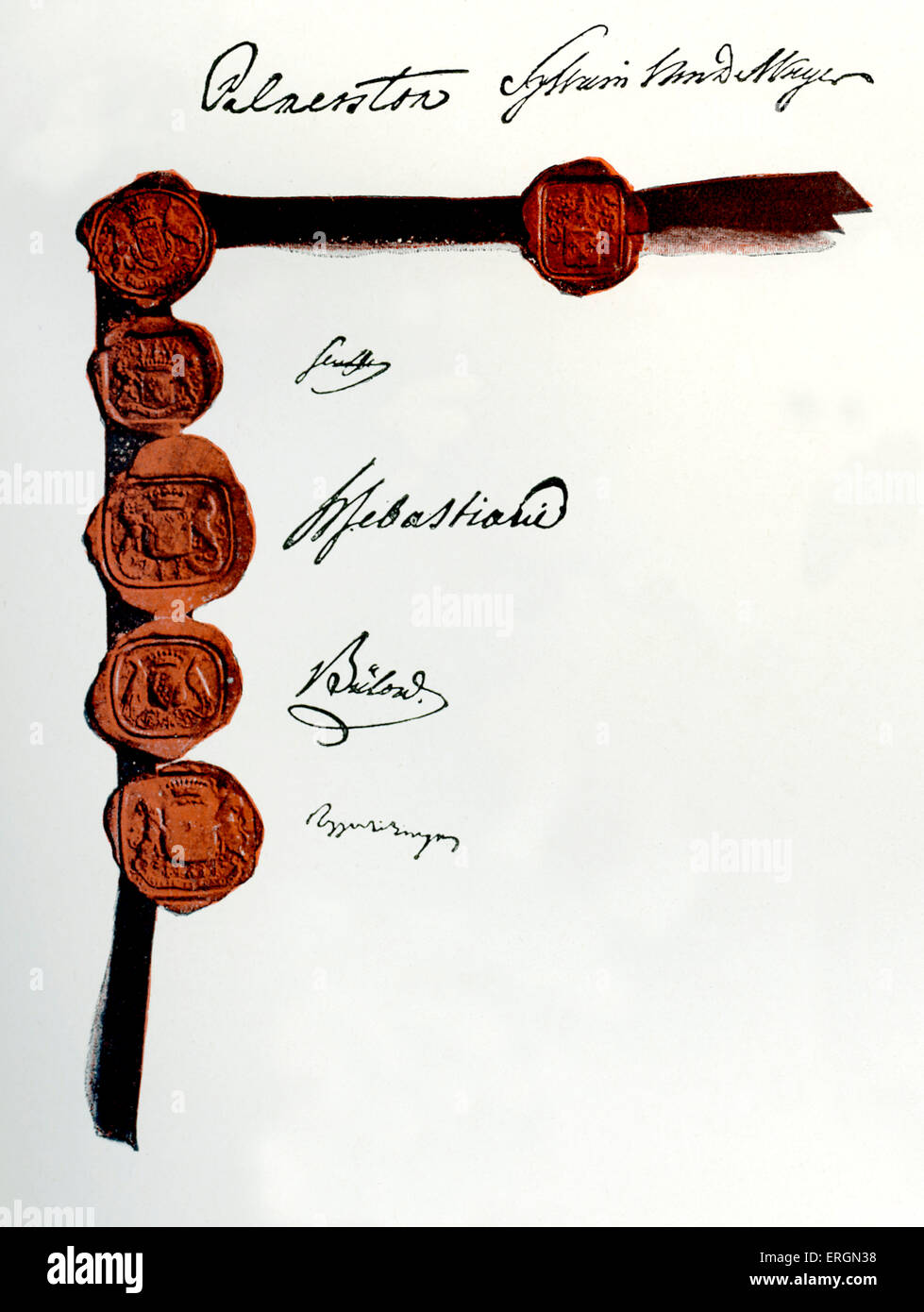Treaty Of London 1839 - "Small page" redirects here. For more specific information, see the Recycling page. For the sediment film, see Sludge paper.
The Concert of Europe was signed on 19 April 1839, between the United Kingdom of the Netherlands and the Kingdom of Belgium. It was a direct sequel to the 1831 Treaty of Article XVIII, which the Netherlands refused to sign, and was the result of negotiations at the London Conference of 1838–1839.
Treaty Of London 1839
Under this treaty, the European powers recognized and guaranteed the independence and neutrality of Belgium and established the full independence of the German-speaking part of Luxembourg. Article VII required Belgium to remain neutral;
Mantell, Gideon Algernon; The Wonders Of Geology Or, A Familiar Exposition Of Geological Phenomena; Being The Substance Of A Course Of Lectures Delivered At Brighton…….in Two Volumes, 3rd Edition, London, Relfe And
In 1830, the Belgians broke away and established the independent Kingdom of Belgium. Many Catholic citizens did not accept the Dutch king's preference for Protestantism, while the French-speaking population protested his dislike of the French language, and the middle classes resented Dutch control of public offices.
Liberals considered the rule of King William I to be tyrannical, while there were high levels of unemployment and industrial unrest among workers.
However the agreement was not accepted by the Dutch, who invaded the country in the autumn of 1831;
And in 1832 French forces captured Antwerp before Belgium and the Netherlands agreed to an armistice.
The Country Twenty Five Miles Round London
Several years later, the Netherlands realized that it had to gain more land by accepting the 1831 agreement than by continuing the war.
The Belgian government, with the support of the French, protested against the late execution of the terms of the agreement, but Britain accepted the Dutch claim; And in 1839, the Dutch acknowledged Belgium's independence (and reclaimed the disputed territories) through the Treaty of London. At the same time, all the Great Powers ratified the liberation of Belgium from the Netherlands.
By treaty, the southern provinces of the Netherlands were, in fact since 1830, internationally recognized as the Kingdom of Belgium, while the province of Limburg was divided into Belgian and Dutch parts.

The Grand Duchy of Luxembourg had a personal union with the Netherlands, while also being a member of the German Confederation. The treaty divided the Grand Duchy. It lost two-thirds of its territory to the new Belgian province of Luxembourg. The partition left the Duchy Grand Duchy, which contained a third of the original territory and half of the original population,
The Treaty Of London: Belgian Independence And The First World War
In personal union with the Netherlands under King-Grand Duke William I (and later William II and William III). This arrangement was confirmed by the Treaty of London in 1867.
Known as the 'Second Treaty of London' in reference to the Treaty of 1839, and lasted until the death of King-Grand Duke William III on 23 November 1890.
"Paper Cloth - List Today", British World Recruiting Poster 1914, Canadian War Museum. "Bülow" as described by Heinrich von Bülow, the Prussian ambassador to Britain.
The de facto independence of Belgium was established in the Nine Years' War. The signatories to the Treaty of London now officially recognized the independent Kingdom of Belgium. The five major European powers (Austria, France, Prussia, Russia and the United Kingdom) also pledged to guarantee Belgium's independence.
The Scrap Of Paper
The treaty was a basic "law-making" agreement that became a cornerstone of European international law; This was particularly important in the processes leading up to the First World War.
The Belgian army was ordered to mobilize on 31 July 1914, and at the same time the Belgian king publicly told Europe that Germany, Great Britain and France were fully committed to honor and prevent the humiliation of their country. are bound.
When the German Empire invaded Belgium in August 1914 in violation of the treaty, the British declared war on 4 August.

Told by the British ambassador that Britain would go to war with Germany because of a violation of Belgium's neutrality, German Chancellor Theobald von Bethmann Hollweg said he did not believe Britain and Germany would go to war "on a piece of paper". ,
Treaty Of Berlin (1878)
The Treaty of London also granted Belgium the right to travel by rail or canal through Dutch territory as an outlet to the German Ruhr. This right was reaffirmed in a 24 May 2005 decision of the Permanent Court of Arbitration in the dispute between Belgium and the Netherlands over railways.
In 2004 Belgium requested the reopening of the Iron Rhine Railway. This was the result of an increase in freight traffic between the port of Antwerp and the German Ruhr area. As part of the European policy of modal shift to increase freight traffic, transport on rail and waterways was now given priority over road transport. The Belgian claim was based on the Treaty of 1839 and the Iron Rhine Treaty of 1873.
After a series of unsuccessful negotiations, the Belgian and Dutch governments agreed to take the matter to the Permanent Court of Arbitration and to respect its decision in the matter.
In a decision of 24 May 2005, the court recognized the rights of Belgium under the treaty of 1839 and the concerns of the Dutch for part of the Menweg National Park nature reserve. The 1839 treaty was still valid, the court found, giving Belgium the right to use and develop the Iron Rhine. However, Belgium would have to finance the improvement of the line, while the Netherlands would have to finance the repair and maintenance of the road. Both the countries will share the cost of the tunnel to be built under the natural park.
Post A Comment:
0 comments so far,add yours